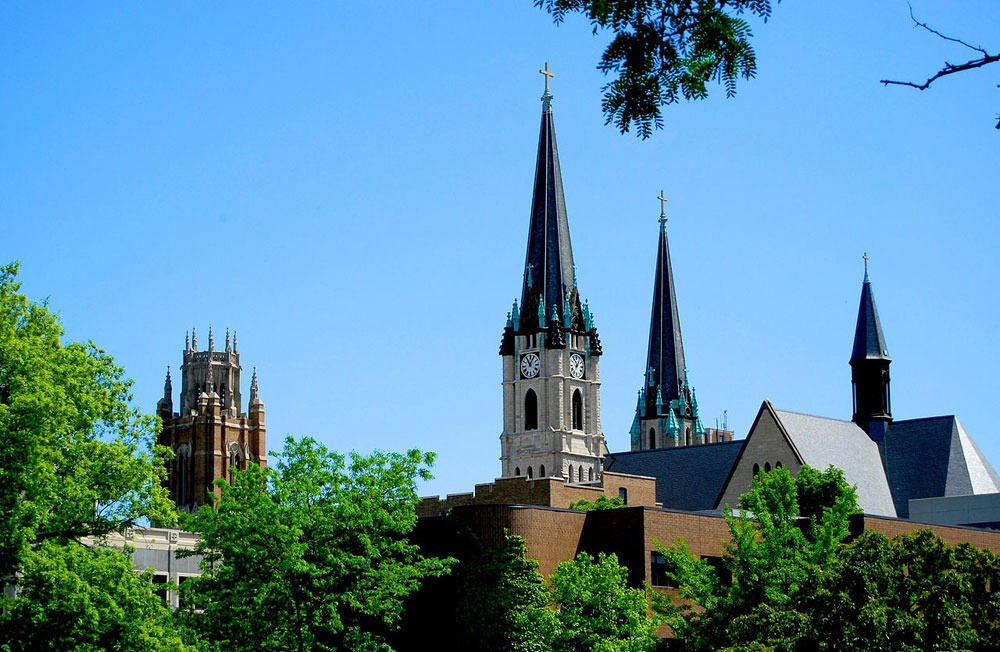
December 1, 2020; Milwaukee Journal Sentinel
In 2018, a book was published called Demographics and the Demand for Higher Education. Written by Carleton College economist Nathan Grawe, the author looked at census data, migration trends, and other information and concluded that universities around the country, and in the Midwest in particular, would be facing a crisis. As NPQ’s Marian Conway noted over a year ago, there are ways to address this, but it requires redesigning offerings to attract segments of the population that are increasing, such as Latinx Americans or immigrants, and/or reaching the growing number of older students returning to college.
According to the Milwaukee Journal Sentinel, this book is being used to justify a series of decisions being made by Marquette University that could radically change the structure and type of university that Marquette will be. Devi Shastri of the Journal Sentinel observes that, “At Marquette, the debate is less around the reality of Grawe’s predictions than it is about what to do in response.”
Some may believe that the decline in enrollment due to the pandemic is driving the changes, but many were underway before the pandemic. In 2019, Marquette reduced its staff size by 2.5 percent through a few layoffs and eliminating some empty positions. This is part of the process of Mike Lovell, president of Marquette, to “right-size” the university and prepare it for the future. Lovell is quoted in the article as saying that loss of enrollment is likely to leave Marquette with a $45 million hole starting in 2022 and beyond. Something must be done, he says.
There are some voices at the university that question the approach. One, Shion Guha, a data science expert and assistant professor at Marquette, questions Lovell’s assumptions and notes similar things as Conway did last year. Is this decline in population growth true among immigrant or Latinx communities? If not, then the university should be seeking ways to recruit those students, rather than cutting jobs.
Grawe’s book particularly points to a decline in the number of college-aged students in the Midwest, and Marquette recruits heavily from the Chicagoland area. Maybe, some people argue, the university should begin to cast a wider net.
Sign up for our free newsletters
Subscribe to NPQ's newsletters to have our top stories delivered directly to your inbox.
By signing up, you agree to our privacy policy and terms of use, and to receive messages from NPQ and our partners.
A different but related question is, just what will any of the changes and cuts mean to the university and its mission? In an article for the Chronicle of Higher Education, Grawe argues that since universities and colleges cannot stop what is coming, they must make adjustments. One, he argues, is to ensure that students see value in their education. He argues this means “they’ve taken courses that they perceive as relevant to their lives and careers.” This is, of course, not a new argument. Predictions of the “death of the liberal arts” date back to the late nineteenth century. Now, as then, the liberal arts university continues to have many defenders.
In an open letter to Lovell, Gregory O’Meara, rector of the Jesuit community and an assistant professor of law at Marquette, contends that this cannot be the only decision-making process. Written on behalf of the Jesuits assigned to Marquette, he argues that the decisions must be based on what the university wants from its graduates. This means well-rounded, caring people whose approach to life is based on broad thinking that can be found in study of the humanities, among other things.
Grawe’s work and his assumptions seem popular at Marquette. However, the potential for racially biased assumptions in data collection and analysis is beginning to be brought up by people like Guha and some nonprofit initiatives like Chicago Beyond. These advocates call for new approaches to data collection that arrive at more authentic truth by involving the people studied, among other things.
We must also remember that any census data that was used in Grawe’s book and the decisions Marquette is making about it may be outdated. After all, a new set of data will be available very soon, following the census conducted this past year. Lovell is not known for his willingness to bend once a decision has been made. In an earlier position, as chancellor of the University of Wisconsin at Milwaukee, Marquette’s cross-town rival, there were allegations of his shutting down a student government that was questioning some decisions he had made.
So, we can only hope that all of these questions, and the suggestions for exploring alternatives, gives Marquette’s decision-making pause. They do have time, after all. The prediction of a $45 million hole in the budget is serious, but the $693 million endowment the University has means it is hardly life-threatening. Perhaps some of that endowment money could even be thought of as investment capital to recruit more people of color and other non-traditional students, something Lovell has stated is a goal, and could help sustain the university for the long run.
In other words, don’t be so quick to cut. Of course, drawing down on endowment capital is a step that should never be taken lightly, but in today’s unusual times, treating a portion of the endowment as risk capital so the university can explore new avenues and make reasoned decisions might prove the wisest course.—Rob Meiksins













